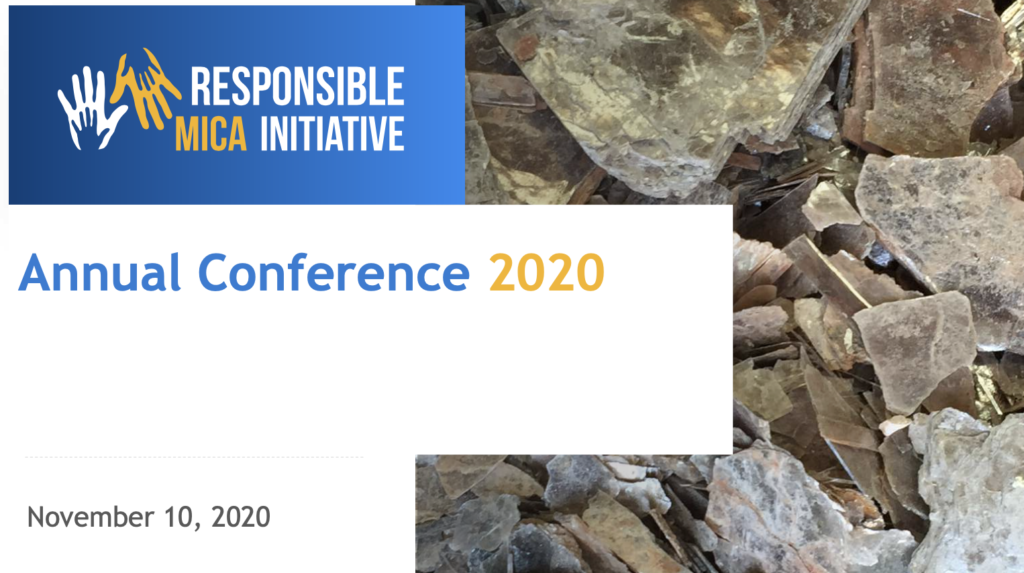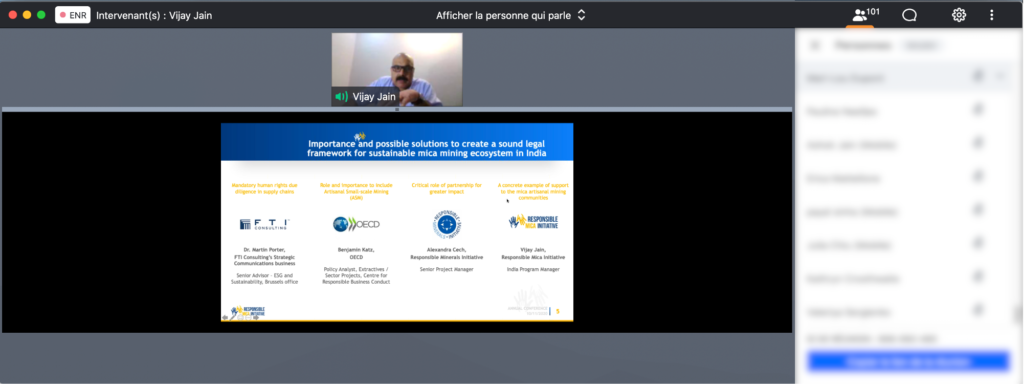
Over two days, more than 80 RMI members, partners and stakeholders met online to attend the Responsible Mica Initiative (RMI)’s 2020 Annual Conference and General Assembly.
Covid-19 pandemic and its consequences for mica-dependent communities in Bihar and Jharkhand were naturally at the heart of all discussions. Beyond its non-questionable impact on the year 2020, the two events also presented the progress made by the Initiative in this tough context, as well as the next milestones to come for RMI. A panel composed by key experts and partners, focusing on the importance of creating a livable legal framework for sustainable mica mining ecosystem in India, brought additional perspectives and examples, for RMI to build these next steps.
A challenging year for mica-dependent communities…
Belonging to most vulnerable people, mica-dependent communities in Bihar and Jharkhand were deeply impacted by the interruption of mica-related activities. Almost immediately when the crisis started, artisanal and small-scale mining (ASM) communities were unable to sell the mica they are daily collecting. The crisis not only highlighted the high level of isolation of mica ASM communities, it also led to the loss of their most important source of livelihood.
In this particular context, RMI and its partners managed to adapt their community empowerment programs, reinforcing focus on livelihood options and especially agriculture and kitchen garden, to offer immediate alternatives to a growing economic and social crisis.
While the pandemic is still striking Bihar and Jharkhand states and is likely to last, participants to the Conferences also had a look to longer term solutions and agreed on the criticality to ensure payment of a living wage or fair price to the mica ASM communities, as a solution to sustainably improve their resilience and livelihood.
… that did not prevent RMI to significantly progress…
As of November 2020, more than 410 children were newly enrolled in schools. 320 vulnerable families beneficiated from a dedicated support to diversify and strengthen their sources of livelihood. Among other government schemes, RMI and its partners were able to link more than 7,400 persons to a social security scheme allowing a better access to health facilities.
Such progress has been enabled by the constant commitment and strong agility of RMI’s partners who are effectively implementing community empowerment programs on the ground. As well, RMI’s flexibility allowed to reroute funds and resources as soon as March 2020, to quickly adapt the activities to newly arising crisis.
Among key milestones reached by the initiative in 2020, the development of the Jharkhand Sustainable Mica Policy Framework under a multi-stakeholder process is worth mentioning. This extensive document was finalized with Jharkhand Government’s representatives in July 2020 and recommends 9 concrete interventions towards the establishment of a fair, responsible and sustainable mica supply chain in India.
RMI was also pleased to see its membership base growing, with the arrival of two key players of the automotive industry, Daimler and Porsche, 1 pigment manufacturer, JointColor, and two mica processors, Ruby Mica and Vedant Exim. RMI members are now representing around 50% of mica volumes exported from Bihar and Jharkhand.
… while clearly identifying areas for improvement
Mica does not stand as an exception. As for the majority of supply chains, Covid-19 pandemic led to a global slowdown of all mica-related activities. As a consequence, some RMI activities had to be delayed, including in-person training sessions dedicated to mica-processors, or pilot on implementation of responsible workplace standards with mica-mines. Conscious that the situation may unfortunately last longer than initially forecasted, RMI is working on alternative ways to resume implementation of these activities.
As part of the global objective of the initiative, the fairness of mica added value distribution alongside the value chain is also at stake, especially when it comes to upstream mica artisanal miners. Now that preliminary necessary steps were covered, RMI recognizes the urge to address this particular topic and will further dig into existing supply chain mechanisms to fulfill this objective of fair distribution in the medium term.
CALL TO ACTION !
If RMI is incredibly happy with the milestones it achieved, in spite of a year fraught with pitfalls, as well as with the increasing visibility of ASM- and mica-related issues, RMI is convinced that with further commitment from all actors involved – from local government to civil society, from non-profit organizations to local and international businesses – we could altogether initiate a strong acceleration and have even more impact.
This was especially highlighted during a panel of experts: efficient and strong partnerships are needed and multi-stakeholder approaches demonstrated their efficiency in other supply chains (read dedicated article here).
Join us to build the short, medium and long term solutions towards the establishment of a fair, responsible and sustainable mica supply chain in India !
